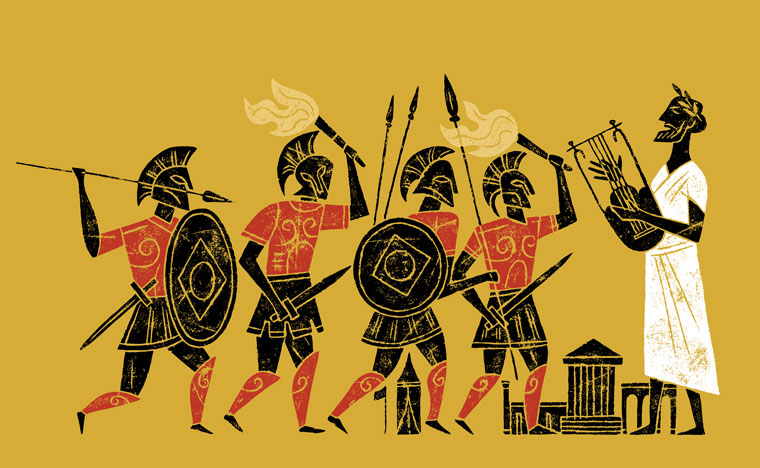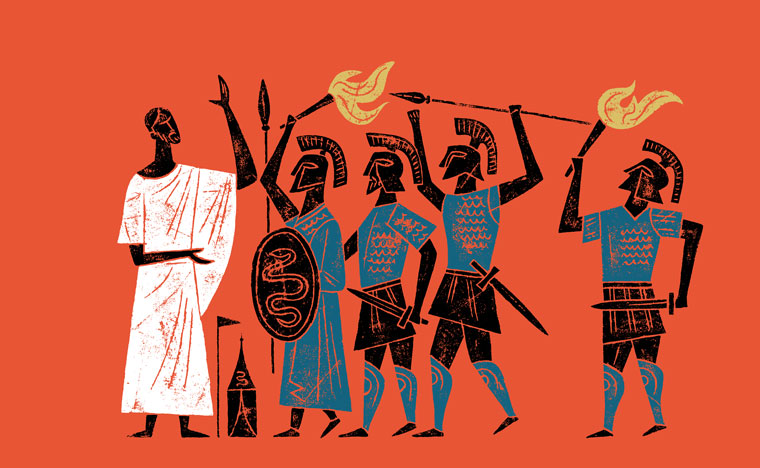After the US Constitutional Convention of 1787, a concerned citizen asked Benjamin Franklin whether the delegates had devised a monarchy or a republic. “A republic, if you can keep it,” Franklin replied. In choosing democracy and education as her inaugural-year theme, President Cristle Collins Judd reinvigorates his challenge.
Democracy is a product of education. The ancient Greeks coined the word democracy and tried the experiment only after centuries of instruction by epic and tragic poets. By questioning traditional values and assumptions, the Greeks’ poet-teachers encouraged their fellow citizens’ understanding of blameworthy and praiseworthy attitudes and behaviors to evolve. Archaic Greek social and political norms and institutions were hierarchical and autocratic or aristocratic, but mythical tales transmitted in poetic verse taught that “noble” and “base” were not products of birth and wealth but manifestations of individual choice and conduct. The Greeks themselves never fulfilled the egalitarian promise of this insight; they continued to keep slaves and to subjugate women. But over many centuries, Greek myths gradually moved the Greeks to despise tyranny and to experiment with broader forms of political participation, exemplified most famously by the Athenians’ direct democracy of the fifth century BCE.
“Noble” and “base” were not products of birth and wealth but manifestations of individual choice and conduct.
Education enabled the Greeks to develop the world’s first democratic political institutions, but today our own democratic republic and institutions of higher education supporting it face existential threats from without and within. Worldwide, we are witnessing the rejection of the rule of law, the rise of populism, the introduction (or reintroduction) of violence into the political process, and brutal power grabs by vicious demagogues and strongmen, who may even have been popularly elected. Simultaneously, many people have begun to dismiss education, particularly in the humanities, as useless or counterproductive. Reasoned intellectual inquiry has come to seem suspect, and feelings have begun to replace facts.
By valuing education, however, the Greeks achieved a historically unprecedented movement away from tribalism and autocracy and toward civil society and nonviolent, democratic political participation. Exposing violent rage as short-sighted and self-destructive, the Greeks’ poet-teachers introduced their status-obsessed, bellicose contemporaries to a new, more constructive mode of resolving conflicts: self-restraint combined with productive conversation. Educated by their own literature, the Greeks prized intellectual inquiry and came to recognize that violence promotes violence and brutality breeds brutality. Over many centuries, ancient Greek literature encouraged the Greeks to distinguish truth from falsehood. It exposed lying as a useful survival skill in a lawless community ruled by a warlord or tyrant but toxic in a lawful community governed by democratic institutions. Greek literature emphasized the tyrannical potential of mob-ocracy (a warning we ignore today at our peril, particularly as we develop 21st-century digital technology).
[Lying was] a useful survival skill in a lawless community ruled by a warlord or tyrant but toxic in a lawful community governed by democratic institutions.
Ancient Greek literature and history remind us that without education, we become undiscerning dupes of demagogues and despots. Without education, democracy becomes merely a disguise worn by tyranny. We don’t wake up totalitarian or fascist one morning; we go to sleep a little more totalitarian or fascist each night. “A government of laws, and not of men,” as John Adams famously put it, requires citizens capable of valuing the rule of law; capable of prioritizing democratic institutions, obligations, and freedoms; and educated to meet the challenges of preserving them.
Written by Emily Katz Anhalt (classics)
Illustration by Jean-Manuel Duvivier
Photo by Jimmy and Dena Katz
Emily Katz Anhalt teaches Greek and Latin at Sarah Lawrence. She is the author of Enraged: Why Violent Times Need Ancient Greek Myths (Yale University Press, 2017). A graduate of Dartmouth College, she received her PhD in classical philology from Yale University and has taught Greek mythology and classical languages, literature, and history at Yale and at Trinity College.


